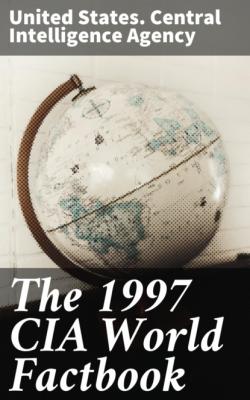The 1997 CIA World Factbook. United States. Central Intelligence Agency
Чтение книги онлайн.
Читать онлайн книгу The 1997 CIA World Factbook - United States. Central Intelligence Agency страница 15
 runways: total: 6 over 3,047 m: 2 2,438 to 3,047 m : 1 1,524 to 2,437 m: 1 914 to 1,523 m: 2 (1994 est.)
runways: total: 6 over 3,047 m: 2 2,438 to 3,047 m : 1 1,524 to 2,437 m: 1 914 to 1,523 m: 2 (1994 est.)
Military
Military branches: Army, Navy, Air and Air Defense Forces, Interior
Ministry Troops, Border Guards
Military manpower - military age: 19 years of age
Military manpower - availability: males age 15–49: 738,082 (1997 est.)
Military manpower - fit for military service: males: 600,403 (1997 est.)
Military manpower - reaching military age annually: males: 31,823 (1997 est.)
Military expenditures - dollar figure: $42 million (1996)
Military expenditures - percent of GDP: 1.5% to 2.0% (1996)
Transnational Issues
Disputes - international: the Albanian Government supports protection of the rights of ethnic Albanians outside of its borders; Albanian majority in Kosovo seeks independence from Serbian Republic; Albanians in Macedonia claim discrimination in education, access to public-sector jobs and representation in government
Illicit drugs: increasingly active transshipment point for Southwest Asian opiates, hashish, and cannabis transiting the Balkan route and cocaine from South America destined for Western Europe; limited opium and cannabis production; ethnic Albanian narcotrafficking organizations active in Central and Eastern Europe ______________________________________________________________________
ALGERIA
@Algeria:Geography
Location: Northern Africa, bordering the Mediterranean Sea, between
Morocco and Tunisia
Geographic coordinates: 28 00 N, 3 00 E
Map references: Africa
Area: total : 2,381,740 sq km land: 2,381,740 sq km water: 0 sq km
Area - comparative: slightly less than 3.5 times the size of Texas
Land boundaries:
total: 6,343 km
border countries : Libya 982 km, Mali 1,376 km, Mauritania 463 km,
Morocco 1,559 km, Niger 956 km, Tunisia 965 km, Western Sahara 42 km
Coastline: 998 km
Maritime claims: exclusive fishing zone: 32–52 nm territorial sea: 12 nm
Climate: arid to semiarid; mild, wet winters with hot, dry summers along coast; drier with cold winters and hot summers on high plateau; sirocco is a hot, dust/sand-laden wind especially common in summer
Terrain: mostly high plateau and desert; some mountains; narrow, discontinuous coastal plain
Elevation extremes: lowest point : Chott Melrhir −40 m highest point: Tahat 3,003 m
Natural resources: petroleum, natural gas, iron ore, phosphates, uranium, lead, zinc
Land use: arable land: 3% permanent crops: 0% permanent pastures: 13% forests and woodland: 2% other : 82% (1993 est.)
Irrigated land: 5,550 sq km (1993 est.)
Natural hazards: mountainous areas subject to severe earthquakes; mud slides
Environment - current issues: soil erosion from overgrazing and other poor farming practices; desertification; dumping of raw sewage, petroleum refining wastes, and other industrial effluents is leading to the pollution of rivers and coastal waters; Mediterranean Sea, in particular, becoming polluted from oil wastes, soil erosion, and fertilizer runoff; inadequate supplies of potable water
Environment - international agreements: party to : Biodiversity, Climate Change, Desertification, Endangered Species, Environmental Modification, Law of the Sea, Ozone Layer Protection, Ship Pollution, Wetlands signed, but not ratified: Nuclear Test Ban
Geography - note: second-largest country in Africa (after Sudan)
@Algeria:People
Population: 29,830,370 (July 1997 est.)
Age structure: 0–14 years : 39% (male 5,923,391; female 5,712,088) 15–64 years: 57% (male 8,619,009; female 8,450,774) 65 years and over: 4% (male 525,556; female 599,552) (July 1997 est.)
Population growth rate: 2.18% (1997 est.)
Birth rate: 28.01 births/1,000 population (1997 est.)
Death rate: 5.76 deaths/1,000 population (1997 est.)
Net migration rate: −0.49 migrant(s)/1,000 population (1997 est.)
Sex ratio: at birth: 1.04 male(s)/female under 15 years: 1.04 male(s)/female 15–64 years: 1.02 male(s)/female 65 years and over: 0.88 male(s)/female total population: 1.02 male(s)/female (1997 est.)
Infant mortality rate: 47.1 deaths/1,000 live births (1997 est.)
Life expectancy at birth: total population: 68.62 years male : 67.5 years female: 69.79 years (1997 est.)
Total fertility rate: 3.48 children born/woman (1997 est.)
Nationality: noun : Algerian(s) adjective: Algerian
Ethnic groups: Arab-Berber 99%, European less than 1%
Religions: Sunni Muslim (state religion) 99%, Christian and Jewish 1%
Languages: Arabic (official), French, Berber dialects
Literacy: definition: age 15 and over can read and write total population: 61.6% male: 73.9% female : 49% (1995 est.)
@Algeria:Government
Country name: conventional long form: Democratic and Popular Republic of Algeria conventional short form: Algeria local long form: Al Jumhuriyah al Jaza'iriyah ad Dimuqratiyah ash Shabiyah local short form: Al Jaza'ir
Data code: AG
Government type: republic
National capital: Algiers
Administrative divisions: 48 provinces (wilayas, singular - wilaya);
Adrar, Ain Defla, Ain Temouchent, Alger, Annaba, Batna, Bechar,
Bejaia, Biskra, Blida, Bordj Bou Arreridj, Bouira, Boumerdes, Chlef,
Constantine, Djelfa, El Bayadh, El Oued, El Tarf, Ghardaia, Guelma,
Illizi, Jijel, Khenchela, Laghouat, Mascara, Medea, Mila, Mostaganem,
M'Sila, Naama, Oran, Ouargla, Oum el Bouaghi, Relizane, Saida, Setif,
Sidi Bel Abbes, Skikda, Souk Ahras, Tamanghasset,